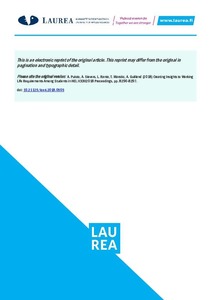Creating Insights to Working Life Requirements Among Students in HEI
Puisto, Anna; Sievers, Anna; Ranta, Liisa; Marstio, Tuija; Guilland, Auli (2018)
Puisto, Anna
Sievers, Anna
Ranta, Liisa
Marstio, Tuija
Guilland, Auli
International Academy of Technology, Education and Development
2018
Julkaisun pysyvä osoite on
https://urn.fi/URN:NBN:fi:amk-2018120520176
https://urn.fi/URN:NBN:fi:amk-2018120520176
Tiivistelmä
In 2016, nearly 1.3 million young people in the EU were out of work and actively sought during 12 months or more for work. Lack of education and work experience were the main driving factors in increasing the likelihood of long-term unemployment. Educational attainment strongly influences labor market participation. One out of two European graduates remained however worried about their career. Moreover, with time some gave up hope of being employed in their field. At the same time, around 38% of the EU companies experienced difficulties in finding suitable candidates. Various reasons could be behind this so-called skill mismatch. According to various studies graduates have insufficient understanding of the required competencies and are unfamiliar with the world of work. Often they lack self-awareness of the skills they have and how they correspond working life requirements. Many students consider that education should assure the development of the working life skills and they neglect their role in the personal and professional enhancement process. This paper discusses a study where the focus was in creating an understanding of recruitment criteria among higher education (HEI) students. The sample consisted of 26 employers. Thirty-two health-care and seven business administration students planned and realized the fieldwork through audio-recorded qualitative interviews and participated in the analysis of the results. The results were in line with previous studies which underlined the importance of the entrepreneurial skills both among business and health-care sector. Some differences appeared in the set of skills required in these two different cases. The study proved out to be an excellent way to create the understanding of the requirements among students who also found the learning method very interesting. Aside from creating deep insight into employers’ expectations, students learned about the various existing options they have when they plan their future career. The study opened views to the specificities of different working environments, and the skills needed to assure future recruitment. If you want to work in a particular work environment (such as a nurse in the business world), you need to work hard to attain the level of skills and competencies required for accomplishing your tasks. The requirements are not similar in every job and work environment. To succeed in building your career path and developing the needed qualities, you have to maintain self-control and have a goal-oriented approach. It seems justified to claim that students should at an early phase of their educational path learn to understand employment requirements. They should also take clear responsibility for their learning process to assure obtainment the competencies needed for future professional and private life. The students’ development process requires support from both working world and education. There is a need for dialogue between employers, educators, and students. Open, up-to-date and continuous interaction and communication between the stakeholders is needed to diminish the skills mismatch and answer to the changing requirements of working life.
